- Home
- Lilith Saintcrow
The Society
The Society Read online
* * *
ImaJinn Books
www.imajinnbooks.com
Copyright ©2005 by Lilith Saintcrow
* * *
NOTICE: This work is copyrighted. It is licensed only for use by the original purchaser. Making copies of this work or distributing it to any unauthorized person by any means, including without limit email, floppy disk, file transfer, paper print out, or any other method constitutes a violation of International copyright law and subjects the violator to severe fines or imprisonment.
* * *
Militae species amor est.
—Ovid
* * * *
PART ONE
Chapter One
It was, as Rowan's best friend Hilary often said, a day of small mishaps turning into complete disasters.
First, Tuna didn't start. The aging Volvo sedan didn't even click when Rowan turned the key that morning, so it became a mad dash to get to the bus stop. That made her twenty minutes late to work—and she was lucky it wasn't twice that—which made the head nurse, Wendy Yamakari, a little piqued. Rowan had been so discombobulated she'd spent a good fifteen minutes of her lunch break crying in the bathroom, more out of sheer frustration than anything else.
Then, as usual when she was upset, the patients started to react. Benny started to scream halfway through the shift, and not even Rowan's calm voice could help him. They had to wrestle him to the ground and use Thorazine. Siegfried slipped back into catatonia, and Marshall was found smoking a cigarette by the fire door, completely naked. Rodney had another of his episodes in the middle of dinner, and the food thrown had a marvelously energizing effect on every other patient in the cafeteria.
As a result, Rowan was two hours late getting home, bone-tired, and had to walk eight blocks from the bus stop. Her purse strap had snapped, and to crown the whole damn day, her shoelace had snapped too and she had a pounding headache.
So when she saw the lights in the abandoned Taylor house on Smyrna Avenue, she was tempted to just let the whole thing lie. Who cared what kids were up to in there? It was three weeks to Halloween, and the strange people were already coming out and doing odd things. Rowan should know; she had a whole ward full of them at work.
But then she thought she saw a flicker of flame in one of the house's upper windows, and that decided her. She'd take a look. If they had a candle or something in there it was a fire hazard, and if she passed by and something happened later, she'd never forgive herself.
So she made her way through the broken-down gate and up the weedy driveway, shivering under the October chill and going cautiously, pushing back a few stray strands of hair that had come loose during the struggle with poor Benny. Her thick-soled nurse's shoes made little noise against the dry cracked concrete, and she had her cell phone out, with 911 on speed dial. It will probably be nothing, she thought, and you'll feel stupid, won't you? But better to feel stupid than to have some teenager die in a house fire because they wanted to do some Halloween woo-woo.
She was tempted—oh, very tempted—to let go a little, maybe look ahead and see who was in the house, but that would have been a violation of privacy. Hearing what other people were thinking was a curse at best, and a double curse at worst. She had worked too hard and come too far to risk exposing what she was to a bunch of drunken teens.
The laurel hedge had gone wild, bending over the low, broken fence and screening her from sight. Once she was all the way up the driveway, she thought maybe she was mistaken. The upper windows of the crumbling old Victorian house were dark and broken, dusty and watchful. I wish the city would level this place, she thought irritably. It's a hazard to life and limb. All those kids with rocks can't wait to break a window or two, and daring each other to sleep here—someone's going to get hurt.
It was more than that, of course. The house sent a cold chill up Rowan's spine. The kids whispered, like Rowan supposed they did about every old abandoned house, that the Taylor house was haunted, that someone had been murdered there, and if you slept there you'd go mad. Rowan didn't know about going mad. She'd seen enough madness to doubt that one night in a rickety old house could drive you into it, but still...
The place looked creepy, and it raised goose flesh up and down Rowan's arms.
Will you just quit it? she told herself. Next you'll be believing in ghosts and fairy tales. Be rational for once, Rowan!
So when she came around the corner and looked at the flagstoned front walk, weeds forcing up through the stones and drifts of fallen leaves lying dry and whispering to either side, she was completely unprepared for what she saw.
A sleek black van was parked on the front walk, its windows blind with privacy-tinting. There was a faint smell of ozone in the air, and flickering candlelight shone out of the broken windows on the first floor. She contemplated this for a second before someone stepped out the front door, making the rickety porch groan.
Rowan ducked back so the overgrown hedge hid her from view. What on earth is going on here? She looked down at her cell phone tucked in her hand. Her purse, clutched against her other side, shifted a little bit.
Instinct insisted she hide, and it was so clear and unavoidable her heart began to pound. She'd only felt it two or three times in her life, but each time it had proved valuable. Whatever was going on there was likely to be uncomfortable, dangerous, or both. Most likely both.
I'm going to take another look, she decided, just to see if I should call the police. Who knows, maybe someone's bought the old wreck? But the chill touching her nape mocked her. Who would buy this place? It had stood empty for at least twenty years, even though urban development was going on all around it.
Rowan peeked around the hedge.
Candlelight still flickered in the windows. She heard the faint echo of footsteps and a low indistinct murmur of voices.
Someone scuffed on the other side of the van. Rowan's heart leapt into her mouth. She thought of retreating, but she hesitated, curiosity and civic duty warring with caution.
"Hello there,” someone said, very low, almost whispering.
Rowan jumped guiltily.
A shadow slid out from behind the van, and her dark-adapted eyes made him out to be a man, taller than her, dressed in a hip-length coat and a pair of jeans. He had both his hands up, like people on TV did when the police had them at gunpoint. “Don't be frightened,” he said. “I won't hurt you."
That was strange enough to nail her in place for a few more seconds. Clutching her purse under one arm and her cell phone in her other hand, she searched through all the words she knew. None seemed applicable. “Hi,” she settled for. “This must seem really strange to you."
"Well, we're out here in the middle of the night, so maybe we're the strange ones,” he said. “You wondered what was going on?"
"Well, yeah,” she admitted. “Look, this house is a firetrap, and it's abandoned. High school kids play around in here, and it's not safe. So I thought I should check it out."
He nodded. “We're investigators, and electric flashlights will interrupt our equipment. And if we worked during the day there'd be a whole bunch of gawkers.” He stood stock-still. Rowan could make out dark hair, cut short, and the glitter of eyes.
Gawkers? Like me? Rowan had the totally inappropriate urge to giggle madly. “Look,” she said, “this is awfully weird."
"I know.” A shadow of amusement in his voice. “You should hear us trying to explain this line of work to our mothers."
"What did you say you were investigating?” she asked carefully.
"I didn't. But I'll tell you. We're parapsychology investigators. We're attached to the University of—"
That was enough for Rowan. She backed up, goose flesh rippling all the way down her back and spilling down her legs, prickles of
chill running along her skin. Chill and a type of electricity that made her entire body tighten. “Oh,” she said. “I'm sorry. Nice to meet you."
"Hey, wait a second,” he began, but she bolted.
She ran down the driveway, clutching her purse and her cell phone, made it through the ramshackle gate and halfway down the block, her heart pounding and her side aching, a stitch grabbing all the way from her left hip almost up to her shoulder. The house on Smyrna Avenue was only four blocks from home. She ran those four blocks, turning right on Ninth Street, running as if the devil was after her, clambering up her own steps and desperately fumbling her keys out of her pocket. It seemed to take forever to get the door open, and when she finally made it inside she threw the two dead bolts and stood, her ribs heaving, gasping for breath, her silent, dark house closing comfortingly around her. Dad must be asleep, she thought, and dropped her purse on the floor next to the door. God, oh my God. Parapsychology. Oh my God. Please, God. Please.
She had been so careful, ever since she'd figured out she was different. She'd avoided anything that might even be faintly considered unorthodox. She'd never even checked out a library book on that sort of stuff, never watched any of the “Unsolved Mysteries” shows or anything else like that.
We're parapsychology investigators. He'd said it so calmly, too. Hopefully he wouldn't recognize her. Hopefully none of their “instruments” had done anything funny while she was there like some other electronic things. When she was upset, she could literally short out small appliances.
She'd stay away from that house, now. Completely away. She couldn't risk it.
The lamp was on, its warm, mellow glow comforting, showing the familiar foyer and the stairs going up, the hall closet's door slightly open, and a painting of her mother hung on the wall. Everything was normal, familiar, and safe. Her heart finally slowed down, and she kicked her shoes off, not caring that the careful knot she'd put in her shoelace was flopping back and forth. “That was a close one,” she muttered.
"Everything okay?” Her father's voice drifted down from upstairs.
Rowan gave another guilty start. “Fine, Dad,” she called. “I'll be up in a minute."
"No, go and get some dinner. I'm only reading in bed. How was work?"
"Long and embarrassing, Dad,” she answered, searching for a light tone. “Did you figure out what was wrong with Tuna?"
"The starter's gone. Hilary dropped by, and we went to the auto parts store and got a new one.” His whisky-rough voice echoed in the stairwell. “Get something to eat, honey. I'll be up for a while."
Hilary had gone to high school with Rowan, and was one of the few people she felt completely comfortable with. “Okay,” she called back. “Do you need anything?"
"Just a good night kiss from my girl,” he replied. “But you eat first, honey. I made chicken soup."
"Sounds good. I'll be up in a few.” Rowan picked up her purse from the floor and set it on the table by the front door. Of course they wouldn't know you're different, Ro, she chided herself, taking a deep breath and slipping out of her coat. Nobody knows. It's okay. You'll never see them again. You're safe. You did the right thing.
She went down the hall into the kitchen, flipping on the light and blinking. The kitchen was neat and clean—two deep-green bowls drip-drying on the rack, the green countertops wiped, a Crock-Pot sitting next to canisters of flour and sugar. It smelled heavenly—garlic and chicken—and Rowan was suddenly aware she was starving.
Ten minutes later, carrying a tray up the stairs, she had a thought that made her stop and almost drop the tray. How did they get the van on the front walk like that? Another chill raced up her spine. Just forget about it, Rowan. If you just ignore it, it'll go away.
She made it to the top of the stairs and carried her tray into her dad's room.
Major Henry Price lay in bed, his crisp blue pajamas immaculate, a textbook on military history facedown on his lap. His short, graying hair was slightly mussed, and Rowan smiled at him. “Hey, Dad. How was your day?"
"Oh, I skinned my knuckles on that damn car of yours,” he replied cheerfully, smiling. His bedside lamp with its green shade was set at precisely the right angle. “We should buy you a new one."
"As soon as we pay off the house, Dad. We're mighty close.” Rowan set the tray down, then kissed her father's cheek. He smelled, as always, of lemon after-shave. “What are you reading about?"
"Oh, just going over some old battles.” Her father's green eyes followed her as she settled down in her usual chair and picked up her mug of soup. “You look pale, sweetie. Did something happen?"
"Oh, I just had an irrational moment on the way home. Ran four blocks.” Rowan shrugged. “It was a weird day at work, Dad. Even weirder than usual."
"Well, you were in a mood when you left,” he pointed out, settling his horn-rimmed reading glasses on his nose and returning to his book. “Every once in a while a day comes along where it's just better to stay in bed."
"Tell me about it,” Rowan said, rolling her eyes. “I'm off tomorrow. I'll help you put the starter in."
"Mmh. I already did it, sweetheart. The car works fine. I just finished about an hour ago, and it was too late to pick you up from work. I called, and that Sickwitzer woman—"
"Sistowicz,” Rowan corrected automatically, around a mouthful of chicken.
"Sickwitzer,” her father promptly agreed. “Well, she said you'd already left."
Rowan crumbled a saltine into her soup. “Thanks for the thought, anyway. I hate riding the bus."
"Mm. Good for the environment.” Her father grinned, and Rowan was startled into a laugh. She was already forgetting the Taylor house. By the time she finished her soup and got ready for bed, she was humming. She had two whole days off, and her car was fixed.
Life was good.
Chapter Two
"Are you sure?” Henderson said, settling the camera back in its spot. The older man closed the case, flipped the locks down, and glanced up at Delgado.
"Pretty damn sure, General. The instruments went crazy.” Delgado shrugged. “She bolted, so I followed her home."
"And?"
"Nice house, about four blocks from here. No security. She's not government.” Delgado folded his arms. Catherine brushed past him, her Mohawk nodding. Thank God our mystery girl didn't see that, he thought humorlessly. Might've scared her off even sooner.
The woman had just appeared out of nowhere as he'd stepped outside to scan the perimeter. She'd blown out the alarms he'd set up, whether by chance or skill, he wasn't sure, but he was beginning to think chance.
Of course she's psi. The instruments were going nuts. And it felt like a jolt of electricity—she's definitely got some talent. Some talent? Lots of talent.
Only one thing bothered him. She'd bolted as if the hounds of hell were after her. He'd been projecting reassurance as hard as he could, but she'd grown more visibly jittery during the whole conversation and finally run away. “I deliberately tried to be nonthreatening,” he said, as Cath fitted her telem rig into its carrying case.
Catherine snorted, her nose-rings glittering. “Since when?"
He ignored the gibe, as usual.
"We should check it out,” Henderson said. “If she's got that much talent, we want to recruit her. If she's government, we need her neutralized. I want to test some more of the telem rigs here and iron out that bug in the flux phasing."
"We could do that back at HQ,” Delgado offered, knowing they couldn't. It was his job to make the suggestion.
"Not bloody likely,” the older man said. “If there's any leakage we'll have Sigma on our tail in no time. And if this woman is psi enough to bust through our perimeter and knock you into a tizzy, Sigma will find her."
Delgado shrugged. He hadn't been able to see much except pale blonde hair, glowing in the uncertain light, and the sparkle of her eyes. She'd been clutching something in her hand, and he'd identified a cell phone and eased his hand away from his gun. She hadn
't noticed. Hadn't had a clue. Civilian.
Then why did she run?
Something about this bothered him. She'd been buttoned-down so tightly she was practically invisible, which meant at least some training. But then why had she run away?
He'd waited until the downstairs lights had turned off, and then made a recon of the house. Nice little two-story affair, old like all the houses in this neighborhood, with a slightly shaggy garden, a clean, green kitchen seen through a bay window. Whoever she was, she was a neat little soul. There were thorny bushes underneath all her windows, which made it a little difficult, but he'd detected no invisible traps or defenses. That made it even more of a puzzle.
"Okay,” Henderson said. “Let's roll back to base and get some chow, team. We'll work out a surveillance on this woman for a few days and see what we can suss out."
"I'll stay,” Delgado offered. “If there's a leak on the telems and it brings Sigma here, they'll try to scoop her up. She's all over the spectrum, General."
Henderson actually paused for a few seconds. “You got it,” he said finally. “Your instincts are too good to disregard, Del. I'll send Zeke over with a car and some chow for you, ten-four?"
Delgado nodded. “Got it. If Sigma shows?"
"Scoop her first and bring her.” Henderson didn't sound happy. The white patch over his right temple glowed in the darkness as he slid behind the wheel of the van. Cath slammed the back doors and leapt into the passenger seat. “And Del, if she's government, get rid of her quietly. We've got to get these rigs running."
"Ten-four.” Delgado backed away, fading into the laurel hedge as the van started with a swift purr. Henderson pulled out carefully, and in a moment all that was left was the smell of exhaust and a dark, abandoned house.
This place gives me the creeps, Delgado thought, looking up at the shattered windows. It was right on a ley line, and there had been a murder committed here in the 1920s. Since then the place had been amplifying and reverberating with psychic turmoil. In another few years it might have active poltergeist phenomenon, which made it the perfect place to test the rigs. The only wrinkle in the otherwise smooth operation had been the sudden appearance of the woman.

 Incorruptible
Incorruptible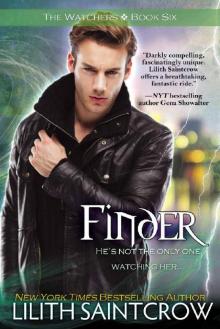 Finder (The Watchers Book 6)
Finder (The Watchers Book 6) Steelflower in Snow
Steelflower in Snow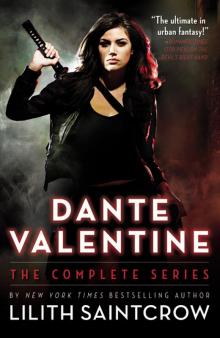 Dante Valentine
Dante Valentine Redemption Alley-Jill Kismet 3
Redemption Alley-Jill Kismet 3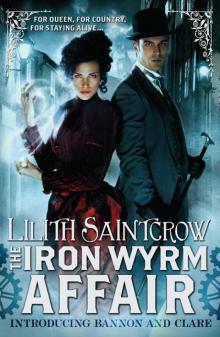 The Iron Wyrm Affair
The Iron Wyrm Affair The Demon's Librarian
The Demon's Librarian The Hedgewitch Queen
The Hedgewitch Queen Redemption Alley
Redemption Alley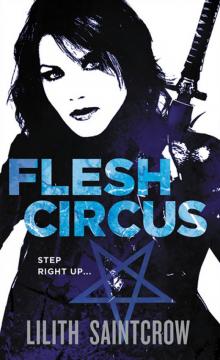 Flesh Circus
Flesh Circus Saint City Sinners
Saint City Sinners Unfallen
Unfallen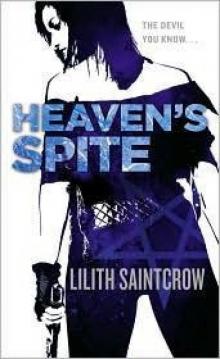 Heaven’s Spite
Heaven’s Spite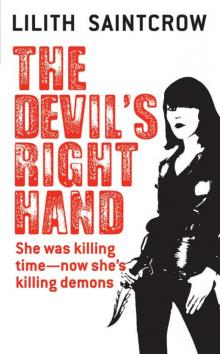 The Devil s Right Hand
The Devil s Right Hand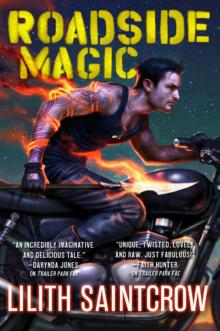 Roadside Magic
Roadside Magic Steelflower at Sea
Steelflower at Sea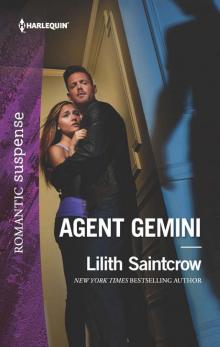 Agent Gemini
Agent Gemini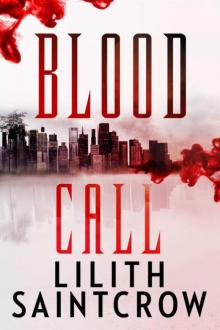 Blood Call
Blood Call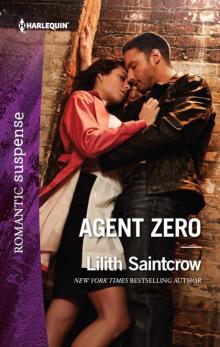 Agent Zero
Agent Zero In The Ruins
In The Ruins Atlanta Bound
Atlanta Bound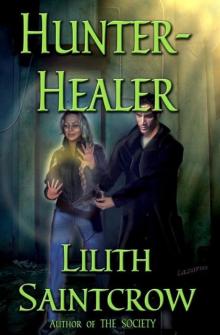 Hunter, Healer
Hunter, Healer Hunter's Prayer
Hunter's Prayer Roadtrip Z_Season 2_In The Ruins
Roadtrip Z_Season 2_In The Ruins Wasteland King
Wasteland King Pack
Pack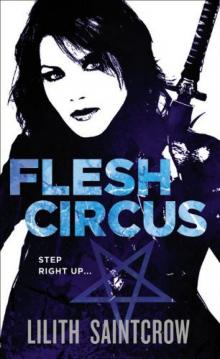 Flesh Circus - 4
Flesh Circus - 4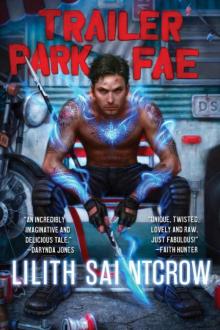 Trailer Park Fae
Trailer Park Fae The Bandit King h-2
The Bandit King h-2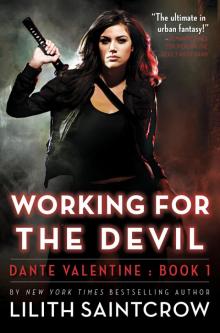 Working for the Devil
Working for the Devil Pocalypse Road
Pocalypse Road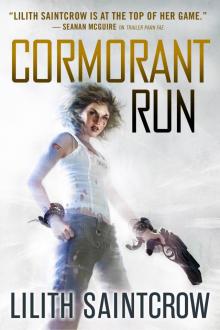 Cormorant Run
Cormorant Run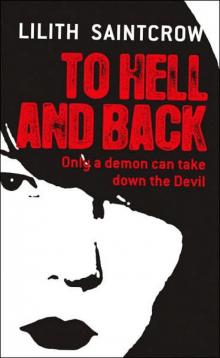 Dante Valentine Book 5 - To Hell and Back
Dante Valentine Book 5 - To Hell and Back Desires, Known
Desires, Known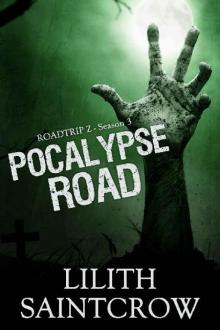 Roadtrip Z (Season 3): Pocalypse Road
Roadtrip Z (Season 3): Pocalypse Road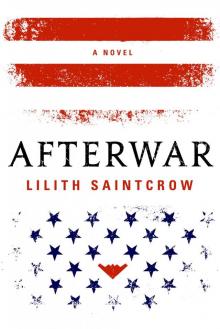 Afterwar
Afterwar Selene
Selene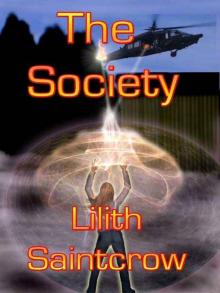 The Society
The Society The Hedgewitch Queen h-1
The Hedgewitch Queen h-1 Night Shift jk-1
Night Shift jk-1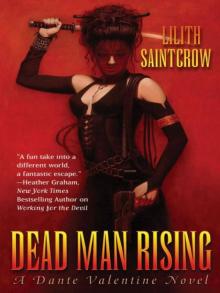 Dead Man Rising
Dead Man Rising Dead Man Rising dv-2
Dead Man Rising dv-2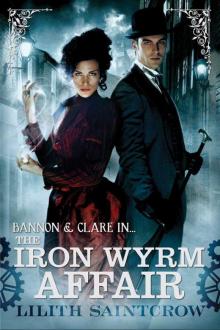 The Iron Wyrm Affair: Bannon and Clare: Book 1
The Iron Wyrm Affair: Bannon and Clare: Book 1 Saint City Sinners dv-4
Saint City Sinners dv-4 Heaven's Spite jk-5
Heaven's Spite jk-5 Beast of Wonder
Beast of Wonder Hunter's Prayer jk-2
Hunter's Prayer jk-2 The Damnation Affair
The Damnation Affair Steelflower
Steelflower The Red Plague Affair: Bannon & Clare: Book Two
The Red Plague Affair: Bannon & Clare: Book Two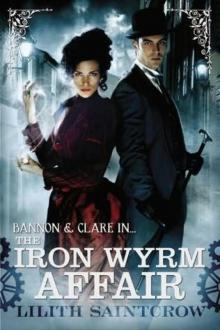 The Iron Wyrm Affair tb&ca-1
The Iron Wyrm Affair tb&ca-1 Flesh Circus jk-4
Flesh Circus jk-4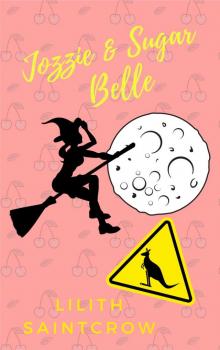 Jozzie & Sugar Belle
Jozzie & Sugar Belle Night Shift
Night Shift The Bandit King
The Bandit King![Hunter, Healer [Sequel to The Society] Read online](http://i1.bookreadfree.com/i1/04/05/hunter_healer_[sequel_to_the_society]_preview.jpg) Hunter, Healer [Sequel to The Society]
Hunter, Healer [Sequel to The Society] The Devil's Right Hand dv-3
The Devil's Right Hand dv-3 To Hell and Back dv-5
To Hell and Back dv-5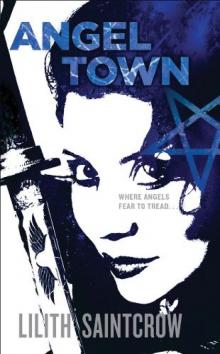 Angel Town
Angel Town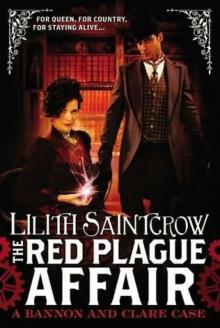 The Red Plague Affair tb&ca-2
The Red Plague Affair tb&ca-2 Redemption Alley jk-3
Redemption Alley jk-3 The Damnation Affair (the bannon & clare affairs)
The Damnation Affair (the bannon & clare affairs) Working for the Devil dv-1
Working for the Devil dv-1